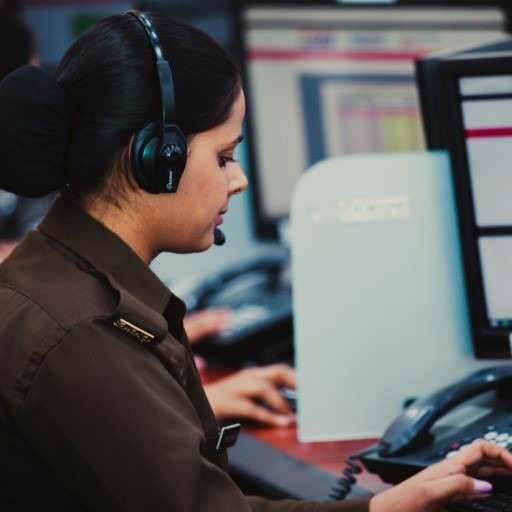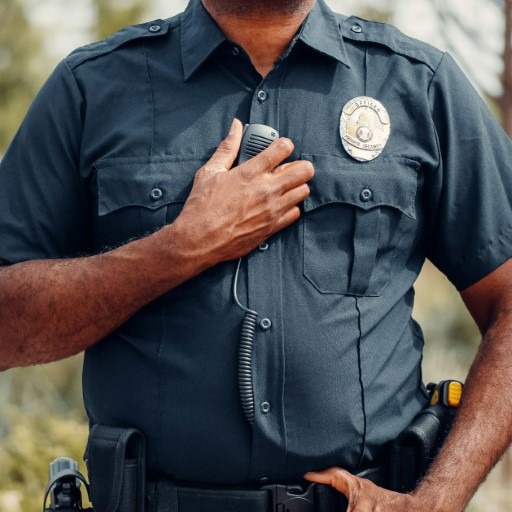How to Become a 911 Dispatcher: A Complete Step-by-Step Guide
What is a 911 Dispatcher?

A 911 dispatcher is a skilled specialist who answers emergency calls and dispatches necessary emergency services, such as police, fire, or medical care.
They provide critical information to the callers, classify the needs, and provide the first responders with the required information for prompt assistance. In addition, dispatchers give instructions and support to callers as the emergency services approach the scene; most of the time, they are the lifeline for people who are in crisis.
What are the duties of a 911 dispatcher?
Answering emergency calls: The duty of dispatchers is to respond quickly to inbound calls for emergency aid from distressed people or report crime.
Gathering information: They will need to combine their skills to ensure that they receive all the useful information from the caller, important details like the nature of the emergency, location, and other necessary details.
Assessing the situation: Despatchers are trained to assess the priority level of each call and determine the type of response required. They use different techniques to get relevant information, and then they evaluate the level of risks or danger that could be associated with the situation.
Dispatching emergency services: The dispatcher’s role is to determine where and to what level of urgency resources are needed through assessment of the situation. The dispatcher then requests the right kind of emergency service responders to the scene, including police, fire, medical, or other specialized units.
Providing instructions: Emergency operators can give callers instructions on the phone in some situations, such as how to perform CPR, as well as how to leave a hazardous area until help arrives.
Communicating with first responders: Dispatchers constantly communicate with the medical field staff while relaying important information (updates and instructions), which is vital to ensure a appropriate and timely response.
Recording information: Emergencies require medical staff to observe and document patients every move carefully, meticulously enter all the call details, including the call timestamp, the caller identification, incident details, and the actions that were/were not undertaken.
Managing multiple calls: According to a large portion of their services, dispatchers will have to answer a several calls simultaneously and prioritize them according to each case’s severity and urgency.
Remaining calm under pressure: One of the most complex parts of the work is remaining calm in very stressful scenes. Dispatchers have a big responsibility of keeping their cool and acting rationally while staying focused on their actions to provide proper coordination of emergency resources.
Adhering to protocols and procedures: Dispatchers operate according to set protocols and procedures depending on the nature of the emergency; hence, they never miss anything of the utmost importance since that’s what’s more useful in emergency response.
Generally speaking, 911 dispatchers are employed in a stressful and daunting line of work. They have the vital roles of communicating well, thinking critically, and having high levels of psychological resilience, all of which contribute to the effective use of emergency services and the saving of lives.
Requirements to be a 911 dispatcher

Education: The minimum needed is usually a high school diploma or a similar certificate. Nevertheless, some agencies may choose to have a person with a higher education, such as an associate or bachelor’s degree, mainly in criminal justice, emergency management, or communications.
Age: The minimum age varies depending on the jurisdiction but is usually between 18 and 21. Although there might not be an age limit for working, some agencies may restrict the age of new employees.
Experience: Although experience in emergency dispatching or a similar field can be beneficial, it is not always mandatory. Several government agencies offer on-the-job training programs to new hires so that they can be trained with the skills and knowledge needed for the job. These programs are usually in-depth and cover different areas of emergency dispatching duties.
In a nutshell, candidates who have good communication skills, the ability to stay calm under pressure, sharp decision-making abilities, and tech proficiency are good bets for the 911 dispatcher job. Besides, the fact that you can work odd hours like nights, weekends, and holidays is demanded most of the time.
What is the testing process to get a job as a 911 dispatcher?
Application Submission: The first step is usually when the candidates send their application for the dispatcher job to the appropriate agency or department.
Written Examination: Candidates may be asked to sit for a written test to evaluate their basic skills, which include reading comprehension, writing ability, and, in some cases, mathematical aptitude.
Typing Test: 911 dispatchers frequently need to input information into computer systems quickly and accurately; thus, a typing test is a way to show employers the speed and accuracy of the typing process.
Multi-Tasking Test: Dispatchers usually have to handle various tasks simultaneously, such as answering the phone, inputting data into the computer, and coordinating emergency responses. Some agencies may administer a multi-tasking test to evaluate a candidate’s capacity to handle these demands well.
Simulation Exercises: Candidates may be involved in fake emergency situations to check their skills in tackling stressful situations. These exercises imitate the real situations that dispatchers can face, which helps the assessors judge the candidates’ decision-making skills, communication skills, and overall performance under stress.
Interview: The successful candidates may be forwarded to the interview stage, where an employer or a panel of interviewers will meet to discuss their qualifications, experiences, and suitability for the role. The interview may include behavioral, situation-based, and questions concerning the candidate’s understanding of the dispatcher position.
Background Check and Screening: Students who pass the initial tests may be subject to comprehensive background checks, such as criminal history, employment verification, and, at times, credit checks.
Training Program: After the selection, candidates typically attend the training programs given by the agency or the department.
In general, 911 dispatcher positions are tested to find people with the necessary skills, abilities, and temperament to perform well in emergency situations and give critical support to first responders and the public.
What types of agencies have 911 Dispatchers?

Law Enforcement Agencies: Almost all police and sheriff departments have their own 911 dispatch centers, which are responsible for managing emergency calls related to crimes, accidents, and other cases where police intervention is necessary.
Fire Departments: Fire departments usually have dispatch centers, which receive emergency calls for fires, medical emergencies, and other incidents that require firefighting and rescue services.
Emergency Medical Services (EMS) Agencies: EMS agencies, such as ambulance services and paramedic units, usually have dispatch centers to coordinate emergency medical responses and transport. The dispatch centers are the link between the emergency call and the dispatcher.
Joint Dispatch Centers: There are certain areas where the emergency calls are handled by either a centralized or a joint dispatch center that consists of the police, the fire, and the EMS. Local governments or private companies may run the centers of these schools.
State Police or Highway Patrol: State law enforcement agencies might have their own dispatch centers to manage emergency calls on state highways and also to assist local agencies when needed.
Emergency Communication Districts: In some areas, emergency communication districts or authorities are in charge of delivering 911 services and running dispatch centers for several agencies within a particular jurisdiction.
Private Companies: In rare instances, private companies can supply 911 dispatch services under contracts with local governments or other entities. These companies usually handle non-emergency calls or are the second line of support during high call times.
In short, 911 dispatchers are the critical link in coordinating emergency responses and ensuring public safety, regardless of the type of agency they work for.
What will disqualify someone from becoming a 911 Dispatcher?
- Criminal history involving felony convictions or serious offenses
- Substance abuse or addiction issues
- Poor driving record with reckless driving or multiple violations
- Financial instability reflected in credit history
- Mental health issues affecting job performance
- Dishonesty, such as providing false information
- Difficulty handling pressure or remaining calm under stress
- Poor communication skills
Even if you’re worried about any of these, it’s crucial to maintain honesty throughout the application process. The impact of these factors may vary depending on state laws and agency rules, influencing the significance of each disqualifier.
What is the pay for a 911 Dispatcher?

The salary of a 911 dispatcher varies depending on geographic location, experience, and the specific agency or organization. In the U.S., the annual salary for 911 dispatchers is usually between $30,000 and $60,000. Nevertheless, in big cities or areas with higher living costs, salaries are usually at the upper end of the scale.
Dispatchers with years of experience will be paid more. Advanced training in the emergency medical dispatch or proficiency in several languages may also be a reason for them to get a higher salary. Overtime, shift differentials for working evenings, nights, weekends, or holidays, and bonuses for additional certifications or skills are factors that can be added to the salary, and thus, the reason for the increased earnings is provided.
What is involved in the 911 Dispatcher Training Program?
Classroom Instruction: Recruits learn various courses such as emergency call procedure, crisis management, legal protocols, and communication techniques in the classroom. The students learn to make decisions about what to ask the callers, how to measure the situation, and how to send the right emergency service.
Call Simulation Exercises: Student volunteers in the training program play the role of emergency callers and learn how to deal with calls in a safe setting. These activities thus make them more confident, able to choose, and calm when things are not going smoothly.
Radio Communication Training: The skill of using radio systems and communication protocols is instilled so that the information can be passed on to emergency responders in the field. They are involved in radio communication skills and radio channel management techniques, and they also learn to prioritize and manage multiple radio channels during emergencies.
Emergency Medical Dispatch (EMD) Training: Many training courses include the EMD certification, which is the process of providing instructions to callers of medical emergencies to the dispatchers before they come in. The training is mostly about subjects such as CPR, childbirth assistance, and basic first aid instructions.
Geographic Familiarization: The dispatchers learn the geography, landmarks, street layouts, and boundaries of their jurisdiction to locate and dispatch emergency services accurately.
Stress Management and Self-Care: Skills-based training that is rigorous and especially demanding covers the knowledge of how to deal with stress and the techniques of how to be self-aware to cope with the emotional high-pressure of the job.
Computer-Aided Dispatch (CAD) System Training: Dispatchers are skilled at using CAD systems, which are useful in call management, resource distribution, and real-time tracing of emergency units. They acquire and utilize the process of data input and retrieval, as well as the navigation of the CAD interface, in emergency situations.
On-the-Job Training: Most trainees, after the classroom lessons, go for on-the-job training, which is supervised by experienced dispatchers. Therefore, they can afford to practice the skills they have been taught during their training and, at the same time, get the experience of working in real emergency call handling and dispatching situations.

 Joseph Libowsky,
Joseph Libowsky,